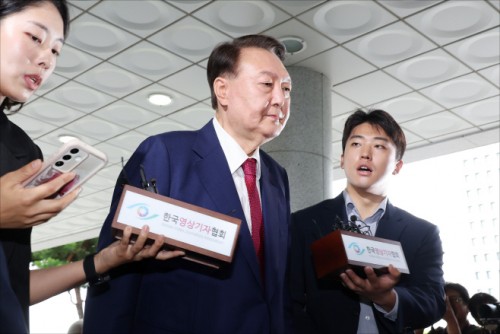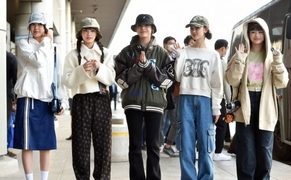 |
| Former President Yoon Suk-yeol arrives at the Seoul High Prosecutors’ Office in Seocho District, Seoul, on July 5 for his second appearance before special counsel Cho Eun-seok’s team investigating insurrection allegations. / Source: Yonhap News |
The special counsel investigating former President Yoon Suk-yeol for insurrection has declared the leak of his arrest warrant application as a “serious criminal act” and vowed strict legal action. While the legal community acknowledges the potential for wrongdoing, many experts believe criminal prosecution remains unlikely. Some interpret the special counsel’s stern response as a strategic move to assert dominance ahead of Yoon’s detention hearing.
Special prosecutor Park Ji-young stated in a briefing on July 7, “We confirmed that the entire arrest warrant application—containing Yoon’s resident registration number and witness statements—was leaked by his legal team.” Park added, “The police will investigate the circumstances of the leak and determine whether to pursue criminal charges or report the case to the Korean Bar Association for disciplinary action.”
If the leak is proven, Yoon’s attorneys could be charged under Article 316 of the Criminal Act for disclosing secrets learned in the course of their duties. They may also face penalties for violating Article 26 of the Attorney-at-Law Act, which mandates confidentiality. Given the inclusion of names, ID numbers, and addresses, violations of the Personal Information Protection Act may also apply.
Legal experts, however, note that such leaks are often considered routine in legal practice and rarely lead to criminal or disciplinary action. Proving intentional or grossly negligent disclosure is another major hurdle.
Attorney Kwak Joon-ho, an expert in criminal law, said, “It’s common practice for documents like arrest warrant applications or indictments to be shared with the National Assembly or the media. Whether these fall within the scope of confidential information obtained in the course of duty remains debatable.”
Another legal professional noted, “While the special counsel can initiate disciplinary procedures, such actions are typically reserved for clear and serious violations. It’s rare for an attorney to be disciplined solely for disclosing legal documents. Even if the process begins, it may not result in actual punishment.”
Some observers believe the special counsel’s rare move to highlight the leak signals a tactical effort to gain an upper hand ahead of Yoon’s bail hearing rather than a genuine intent to prosecute.
A former prosecutor commented, “Leaks of investigative records are even more common within the prosecution. Still, this case involves identifiable personal information, which does raise legal concerns. It seems the special counsel is using this moment to exert psychological and legal pressure on Yoon’s defense team.”
Most Read
-
1
-
2
-
3
-
4
-
5
-
6
-
7





















